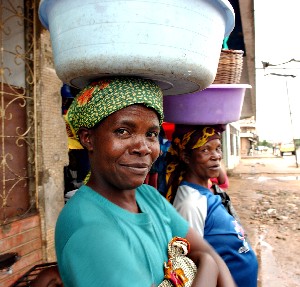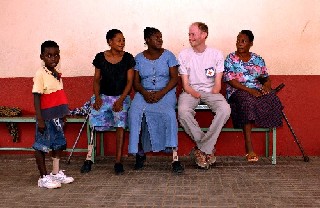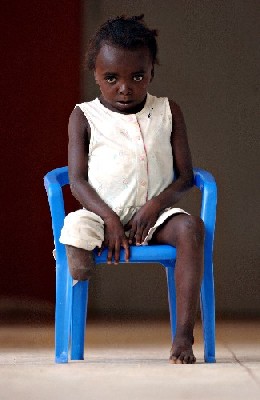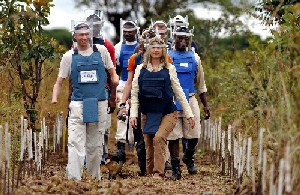| It’s just over four years now since the mountaineering accident in the French Alps which took the life of my best friend, Jamie Fisher. I survived, just, but the accident cost me the most precious of assets, my hands and my feet. Since then I would estimate that I have been through about nine or ten pairs of prosthetic legs and have had a whole host of prosthetic arms, driving aids, walking poles and mountaineering adaptations made for me. Being on the NHS I have no idea of the total cost of my prosthetic treatment but would guess that it is well into the tens of thousands of pounds. Carlo Natal is five years old. When he was a toddler he was being carried on his mother’s back when they were caught in the crossfire between Angolan government forces and rebel UNITAS fighters. Carlo’s mother was killed and he was shot in his right leg which had to be amputated. Living in a country whose infrastructure has been torn apart by nearly thirty years of war, with little or no healthcare or welfare facilities available to the majority of the population, Carlo’s future didn’t look bright. When I ran the London Marathon last year, I raised money on behalf of the British Red Cross for amputees such as Carlo so I was very interested to see for myself the difference that the Red Cross is making in Angola.  As we drove through the hopelessly potholed streets of Luanda, Angola’s capital city, one of the things that most struck me, apart from the dilapidated state of most of the buildings, the vast piles of rotting garbage, and the abject poverty of the dozen’s of beggars by the side of the road, was the amazing number of amputees. As we drove through the hopelessly potholed streets of Luanda, Angola’s capital city, one of the things that most struck me, apart from the dilapidated state of most of the buildings, the vast piles of rotting garbage, and the abject poverty of the dozen’s of beggars by the side of the road, was the amazing number of amputees.In the UK I probably spot another amputee on the street less than once a month. In Luanda there seemed to be someone missing a leg, or two, hobbling along on crutches, or struggling with a battered wheelchair, on every corner. There are no official statistics for how many amputees there are in Angola but it is certain that the loss of a limb there is a common occurrence. A lot of amputees are casualties of the war – soldiers, many of whom were conscripted as children. Others are innocent victims of the fighting, caught in the crossfire or blown up by landmines. More still have lost limbs when small injuries have gone untreated simply because of the difficulty in getting to a hospital. And despite the encouraging fact that the civil war ended over a year ago, the carnage still continues as rural people, returning to the land after years of displacement, encounter the hidden legacy of the war. The UN estimates that up to six million landmines and items of unexploded ordinance lie concealed in Angola, waiting to kill, maim and wreck the lives of unsuspecting civilians going about their everyday business. The thirty or so patients I met at the Neves Bendinha Orthopaedic Centre in Luanda were typical of the kind of people who have lost limbs in Angola. Male, female, young and old, all have one thing in common and that is poverty. Many have nothing at all and come to the centre from the streets of the city where as amputees their only chance of making a living is by begging. Others come from the surrounding countryside where the loss of a limb has made growing food to feed their families a near impossible task.  The Neves Bendinha centre, operated by the International Committee of the Red Cross, sets out to give these people a chance. The manufacture of effective prosthetic limbs has traditionally been a very expensive procedure, only possible for the wealthier nations of the world, but by adapting the technology developed in the west the Red Cross manages to produce surprisingly high quality and cost effective prosthetic limbs. The Neves Bendinha centre, operated by the International Committee of the Red Cross, sets out to give these people a chance. The manufacture of effective prosthetic limbs has traditionally been a very expensive procedure, only possible for the wealthier nations of the world, but by adapting the technology developed in the west the Red Cross manages to produce surprisingly high quality and cost effective prosthetic limbs.Component parts are mass produced in Geneva and shipped out in bulk. These components are made of cheaper materials such as plastic and steel, compared to the carbon fibre and titanium of my own limbs, but little is sacrificed in terms of strength and weight. It is important too that the machinery and tools used to assemble the limbs are simple and easy to service as spare parts are unlikely to be available. Qualified prosthetists and technicians are required but the Red Cross has a policy of employing local staff where possible, training them so that one day all ex-pat staff can withdraw and the centre can be fully independent. Entering the centre I was amazed at how similar it was to my own limb centre in Edinburgh – in fact the compound was probably nicer than the run down hospital building which temporarily houses the Edinburgh centre. The tropical sun blazed down into the central courtyard of the compound while round the inner walls patients sat on benches, waiting in the shade. They were of all ages, the old ones sitting patiently with tired expressions on their faces, resigned to a life that they know will always been hard. The kids tore around in pursuit of one another, like children anywhere in the world, seemingly indifferent to the crutches and prosthetic legs that were part of their games. And groups of young men and youths, mainly ex-soldiers, gathered in conspiratorial groups, chatting in low voices and playing cards.  Inside the building we saw patients being assessed and fitted for artificial limbs, and doing their daily physiotherapy under almost military supervision. The standard of treatment was obviously very high and the procedures differed little from those I have experienced in the UK. Outside the physio room, in a small courtyard, was an assault course constructed from concrete blocks, ramps, tyres and short ladders. A dozen patients wearing newly fitted prosthetic legs marched diligently in file round and round the course, struggling to balance as they tackled each obstacle. I shudder to think what sort of protest would occur if the average group of UK amputees was forced to undertake such a difficult challenge but in Angola, which has precious little in the way of level walking surfaces, every amputee has to be trained for all terrain. Inside the building we saw patients being assessed and fitted for artificial limbs, and doing their daily physiotherapy under almost military supervision. The standard of treatment was obviously very high and the procedures differed little from those I have experienced in the UK. Outside the physio room, in a small courtyard, was an assault course constructed from concrete blocks, ramps, tyres and short ladders. A dozen patients wearing newly fitted prosthetic legs marched diligently in file round and round the course, struggling to balance as they tackled each obstacle. I shudder to think what sort of protest would occur if the average group of UK amputees was forced to undertake such a difficult challenge but in Angola, which has precious little in the way of level walking surfaces, every amputee has to be trained for all terrain.Watching those people, some of whom were walking on their prosthetic legs for the very first time, took me right back to my own hesitant first steps in hospital in Edinburgh and I felt very privileged to be able to witness what I knew was a very emotional process. I chatted with as many of the patients as I could, sharing our experiences of what it’s like to live without limbs. Most of them had never met a European amputee before and were fascinated to hear my story. My Portuguese being limited to a couple of dozen words, it was fortunate that I had brought a photo album with me and through the common language of pictures I told them about my family, my home, my mountaineering and my running. In turn they described to me their experiences – their lives during the war, the often horrific accidents that had led to their amputations, the difficulty of managing without a limb in a society where the only jobs available to them are manual ones. Many patients leave the centre to return to a life of begging where ironically their prosthetic legs put them at a disadvantage. So they leave their legs at home. The stories of these people made me realise how truly fortunate I was. The next day we visited another orthopaedic centre in Viana on the other side of Luanda, this one operated by the Spanish Red Cross. The Viana centre is very similar to Neves Bendinha although not only do they provide beneficiaries with prosthetic legs, they also attempt to send them away from the centre with a new career. The centre is fully residential and while patients are receiving prosthetic treatment they also attend retraining classes, learning a trade such as tailoring, metalwork or electrical repairs. When they leave the centre, hopefully walking again, they are given enough equipment and materials to start up a small business. The program is very successful and we visited several previous beneficiaries who now have clothing alteration businesses in the local markets and steel fabrication businesses run from their homes. Luanda is by far the biggest city in Angola and it is growing every day as people displaced by the war continue to flood in, but the city itself was never directly affected by the war and it is in the provincial towns and villages which were strongholds of the rebel forces that the devastation is most severe. A short flight inland – you can’t travel overland as the roads are all mined – is the town of Huambo, built by the Portuguese as a utopian new capital of Angola, shortly before they relinquished power back in 1975. With its wide boulevards, tree lined squares and elegant buildings it is easy to imagine it as an idyllic place to live. Today however, Huambo is a shell. Every building and wall is riddled with bullet holes, every road is ploughed by bomb craters, and any repairs that have been made to the fabric of the town are done in the most crude fashion using whatever rudimentary materials are available. Yet people still live here – they have no choice – and slowly they are attempting to rebuild their town and replant the surrounding fields. The ICRC operate another orthopaedic centre here, where we visited more casualties of the war, many of them victims of landmines. Thankfully the town itself is clear of mines now, as are one or two of the roads, but take one step off the road and it could be your last as Huambo is encircled by minefields.  The Halo Trust, a charity based in Scotland, has undertaken the fairly enormous task of clearing these minefields. Christian Richmond, manager of the programme in Angola, took us to visit a minefield in the process of being cleared. As our group, togged up in blast jackets and visors, walked down the narrow lane bordered with white marker sticks that Christian assured us was safe, I felt unusually unstable on my prosthetic legs and took great care to avoid stumbling into the undergrowth. The Halo Trust, a charity based in Scotland, has undertaken the fairly enormous task of clearing these minefields. Christian Richmond, manager of the programme in Angola, took us to visit a minefield in the process of being cleared. As our group, togged up in blast jackets and visors, walked down the narrow lane bordered with white marker sticks that Christian assured us was safe, I felt unusually unstable on my prosthetic legs and took great care to avoid stumbling into the undergrowth.The field, which bordered a school, looked perfectly innocent, but red skull and crossbone signs and the very knowledge of the ground’s hidden menace gave the place a distinct feeling of evil. Despite great advances in mine clearing technology much of the work involved is simple, arduous labour. For a short while we watched Christian’s men, sitting on the ground under the baking sun, scraping painstakingly away at the soil with a trowel, inch by inch, and I found it hard to imagine the amount of effort it would require to cover the whole site. It costs only a couple of pounds to lay a landmine, but many hundreds of pounds to remove it. We made one further stop on our tour of Angola, at a small town called Kuito which is if anything even more pitifully ruined than Huambo. In Kuito large buildings stand partially collapsed, suspending great sheets of concrete perilously over the streets below. People still live in those buildings. However in Kuito, despite their plight, or perhaps because of it, the resolve and determination of ordinary people shines persistently through. This was particularly true at the Kuito Orthopaedic Centre where as usual we met a host of amputees, some of whom had travelled many miles from their homes to receive prosthetic treatment. In the garden of the centre, under a shady lean-to, a large group of women sat gossiping and weaving straw bowls and hats. The ladies were very curious to meet me and when I showed them my pictures and told them my story they were extremely sympathetic and concerned. Shortly, it was explained to me through an interpreter that the ladies wanted to give me a traditional gift that would bring good luck and a strong recovery after an accident. The gift was turtle, said the interpreter. For a horrified moment I thought the ladies might be offering me turtle soup or stew, or worse still some piece of illegal turtle shell art, but I was then presented with a very large and alive tortoise which until then had been minding its own business in another corner of the garden. I thanked the women profusely for the gift, but explained that I wouldn’t be able to take it home with me. Not a problem, said the ladies, they would give me a bag to carry it in. Eventually I persuaded the ladies to keep their tortoise and it remains in Kuito Orthopaedic Centre, going under the new name of Jamie. Or perhaps the ladies say that to all of their visitors. Kuito is where I met five year old Carlo Natal, a cheeky wee boy with a big grin. Nothing can bring back his mother now, but thanks to the Red Cross he has a brand new prosthetic leg on which he can run about, play with other children, and walk to school. If Carlo’s country can manage to get itself back on its feet in the next few years, and the government can break the nasty habit of corruption which is currently so endemic in Angola, then perhaps his future won’t be so bleak after all.
|
287 thoughts on “Angola”
Leave a Reply
You must be logged in to post a comment.
Pingback: Skidson
Pingback: Chat Online
Pingback: My Site
Pingback: Discord
Pingback: Fantasy MMORPG
Pingback: Fantasy MMORPG
Pingback: Browser MMORPG
Pingback: Browser MMORPG
Pingback: Browser MMORPG
Pingback: Fantasy MMORPG
Pingback: Browser MMORPG
Pingback: Fantasy MMORPG
Pingback: Fantasy MMORPG
Pingback: Free VPS
Pingback: Fantasy MMORPG
Pingback: AQW
Pingback: Fantasy MMORPG
Pingback: AQWorlds
Pingback: AQW
Pingback: AQWorlds
Pingback: MMORPG
Pingback: MMORPG
Pingback: Adventure Quest Worlds
Pingback: MMORPG
Pingback: Adventure Quest Worlds
Pingback: mylan tadalafil
Pingback: can someone write my essay
Pingback: expert essay writers
Pingback: essay community service
Pingback: college essay help nyc
Pingback: essay help forum
Pingback: custom essay writing online
Pingback: essay custom writing
Pingback: college essay community service
Pingback: legitimate essay writing service
Pingback: best custom essay writers
Pingback: essay correction service
Pingback: college essay proofreading service
Pingback: help writing my college essay
Pingback: best mba essay writing service
Pingback: legit online pharmacy cialis
Pingback: india pharmacy cymbalta
Pingback: zoloft online pharmacy no prescription
Pingback: online pharmacy valtrex
Pingback: permethrin cream pharmacy
Pingback: sell cialis
Pingback: buy viagra in uk
Pingback: tadalafil pulmonary hypertension
Pingback: sildenafil where to buy
Pingback: lilly tadalafil 20 mg
Pingback: can i buy viagra online in australia
Pingback: sildenafil online no prescription
Pingback: cheap generic cialis in the us
Pingback: sildenafil citrate 100mg
Pingback: where to buy sildenafil citrate
Pingback: elevex tadalafil 20mg
Pingback: when will cialis become generic
Pingback: buy zithromax online pharmacy no prescription needed
Pingback: compound pharmacy online
Pingback: tadalafil pharmacy
Pingback: generic viagra usa pharmacy
Pingback: cialis effectiveness
Pingback: buy sildenafil mexico
Pingback: tennessee board of pharmacy tramadol
Pingback: canadian pharmacy viagra 150 mg
Pingback: female viagra pill where to buy
Pingback: buy viagra now
Pingback: price of viagra
Pingback: online medical stores sell tadalafil without medical prescription in india
Pingback: bactrim zelitrex
Pingback: gabapentin labeling
Pingback: flagyl formulations
Pingback: nolvadex tamoxifeno
Pingback: lisinopril teaching
Pingback: metlong metformin
Pingback: ozempic x rybelsus
Pingback: not losing weight on semaglutide
Pingback: 911
Pingback: duloxetine and hair loss
Pingback: metronidazole martindale
Pingback: azithromycin high q
Pingback: escitalopram controlled
Pingback: gabapentin teratogenicity
Pingback: cymbalta and vyvanse
Pingback: fluoxetine long half life
Pingback: spiraldynamics
Pingback: what is ciprofloxacin 500mg tab used for
Pingback: para que sirve cephalexin 500
Pingback: bactrim ds for skin infection
Pingback: bactrim for sinus infection
Pingback: how long does amoxicillin stay in your system
Pingback: bupropion-naltrexone (contrave) side effects
Pingback: benefits of stopping citalopram
Pingback: flexeril addictive
Pingback: ezetimibe lovastatin
Pingback: side effects of iv ddavp
Pingback: depakote dr vs er
Pingback: cozaar without prescription
Pingback: flomax passing kidney stones
Pingback: aripiprazole 30 mg tablet
Pingback: bupropion dose
Pingback: baclofen max dose
Pingback: amitriptyline for migraines
Pingback: repaglinide doses
Pingback: why take diltiazem on empty stomach
Pingback: actos tecnicos
Pingback: robaxin high
Pingback: tamsulosin medline india
Pingback: furosemide and spironolactone together
Pingback: remeron for panic attacks
Pingback: tizanidine schedule
Pingback: can abilify be cut in half
Pingback: synthroid ordering
Pingback: ivermectin cream canada cost
Pingback: acarbose source
Pingback: tongue sores and voltaren
Pingback: viagra levitra order
Pingback: tadalafil canadian pharmacy
Pingback: xlpharmacy viagra
Pingback: sildenafil pulmonary hypertension dose
Pingback: mexican pharmacy valium
Pingback: levitra 20mg buy
Pingback: ivermectin 500mg
Pingback: ivermectin 6mg dosage
Pingback: sildenafil uk pharmacy
Pingback: vardenafil levitra
Pingback: tadalafil tablets 20 mg side effects
Pingback: animal porn
Pingback: animal porn
Pingback: ananın amı
Pingback: child porn
Pingback: how long before bed should i take gabapentin
Pingback: does amoxicillin treat strep
Pingback: metronidazole dosage for 20 lb dog
Pingback: cephalexin for dogs ear infection
Pingback: prednisone dose
Pingback: lyrica and weight gain
Pingback: ampicillin is an example of what medication type
Pingback: how much valtrex should i take during an outbreak
Pingback: ciprofloxacin vs amoxicillin for uti
Pingback: metformin toxicity
Pingback: lisinopril and ibuprofen
Pingback: porn
Pingback: Cocuk pornosu
Pingback: child porn
Pingback: child porn
Pingback: child porn
Pingback: porn
Pingback: sex
Pingback: porn
Pingback: sex historie
Pingback: hardcore porn
Pingback: child porn
Pingback: sex
Pingback: spam
Pingback: porn
Pingback: zofran pharmacy
Pingback: clomid pharmacy
Pingback: online pharmacy without prescription
Pingback: buspirone online pharmacy
Pingback: cheapest pharmacy to get prescriptions filled
Pingback: starzbet
Pingback: starzbet
Pingback: farmacias online seguras
Pingback: farmacia online envГo gratis
Pingback: porn
Pingback: child porn
Pingback: can i buy prednisone online in uk
Pingback: buy prednisone online paypal
Pingback: child porn
Pingback: pin up казино
Pingback: pin up
Pingback: iporn
Pingback: child porn
Pingback: porn
Pingback: porn
Pingback: porn
Pingback: meritking
Pingback: meritking
Pingback: meritking
Pingback: meritking
Pingback: meritking
Pingback: meritking
Pingback: meritking
Pingback: spam
Pingback: child porn
Pingback: hardcore porn
Pingback: porn
Pingback: spam
Pingback: track location by phone number
Pingback: Konya Seo Uzmanı
Pingback: Buy instagram followers
Pingback: web sitesi kurma
Pingback: biznes kniga
Pingback: cristiano ronaldo skills
Pingback: 10000
Pingback: 9gm.ru
Pingback: hdorg2.ru
Pingback: raso.su
Pingback: child porn
Pingback: child porn
Pingback: child porn
Pingback: child porn
Pingback: porn
Pingback: porn
Pingback: porn
Pingback: porn
Pingback: porn
Pingback: simdi ananı sıktım senin
Pingback: child porn
Pingback: buy levitra us
Pingback: sildenafil coupon
Pingback: sildenafil side effects with alcohol
Pingback: how much is sildenafil 100 mg at walmart
Pingback: levitra 20mg price in usa
Pingback: buy levitra online
Pingback: preferred care pharmacy tramadol
Pingback: sildenafil 100mg como tomar
Pingback: buy levitra with prescription
Pingback: tadalafil 20 mg pill identifier
Pingback: sildenafil 100mg review
Pingback: pharmacy that sells phentermine
Pingback: over the counter sildenafil
Pingback: sildenafil viagra vardenafil levitra and tadalafil cialis
Pingback: generic vardenafil cvs
Pingback: cheapest online pharmacy india
Pingback: porn
Pingback: tadalafil side effects liver
Pingback: what can you not take with tadalafil
Pingback: how much tadalafil should i take
Pingback: tegretol exhaustion
Pingback: child porn
Pingback: vxi.su
Pingback: infant motrin dropper
Pingback: neurontin pills
Pingback: preoperative gabapentin
Pingback: indomethacin recreational uses
Pingback: amitriptyline for sleep
Pingback: elavil tramadol interactions
Pingback: cost of imitrex nasal spray
Pingback: can you drink alcohol mebeverine
Pingback: diclofenac 1% gel 100gm
Pingback: site
Pingback: rizatriptan canada
Pingback: side effects of imuran medication
Pingback: lioresal 10 mg effetti collaterali
Pingback: azathioprine alcohol side effects
Pingback: iwbc.ru
Pingback: djss.ru
Pingback: electrical supplies artane
Pingback: cyproheptadine hcl 4mg used
Pingback: periactin for gastroparesis
Pingback: where can i get toradol without dr prescription
Pingback: pstat
Pingback: ddfr.ru
Pingback: imkor.ru
Pingback: child porn
Pingback: edu-url-http.ru
Pingback: Free-Proxy-socks5-socks4.ru
Pingback: ananızı sıkecem
Pingback: iu0000ytre
Pingback: sitnikov
Pingback: anatoliy-alekseyevich-derkach.ru
Pingback: porn
Pingback: dilts.g-u.su
Pingback: child porn
Pingback: child porn
Pingback: child porn
Pingback: madride anti kasma ananı sıkerım
Pingback: xblx.ru
Pingback: r2f.ru
Pingback: psy
Pingback: 439W6fo
Pingback: child porn
Pingback: My Homepage
Pingback: child porn
Pingback: child porn
Pingback: child porn
Pingback: child porn
Pingback: porn
Pingback: porn
Pingback: child porn
Pingback: child porn
Pingback: child porn
Pingback: child porn
Pingback: porn
Pingback: grandpashabet